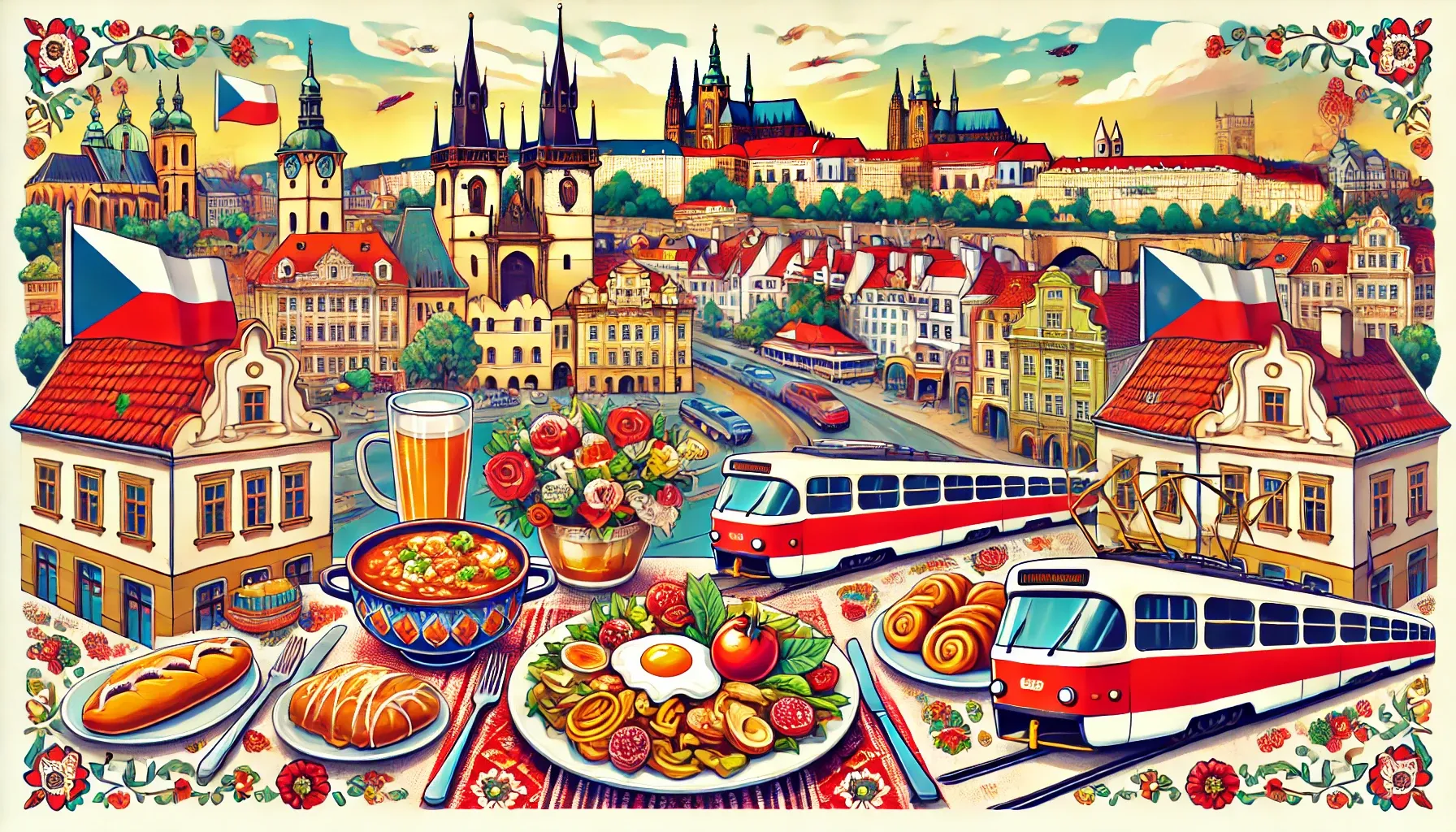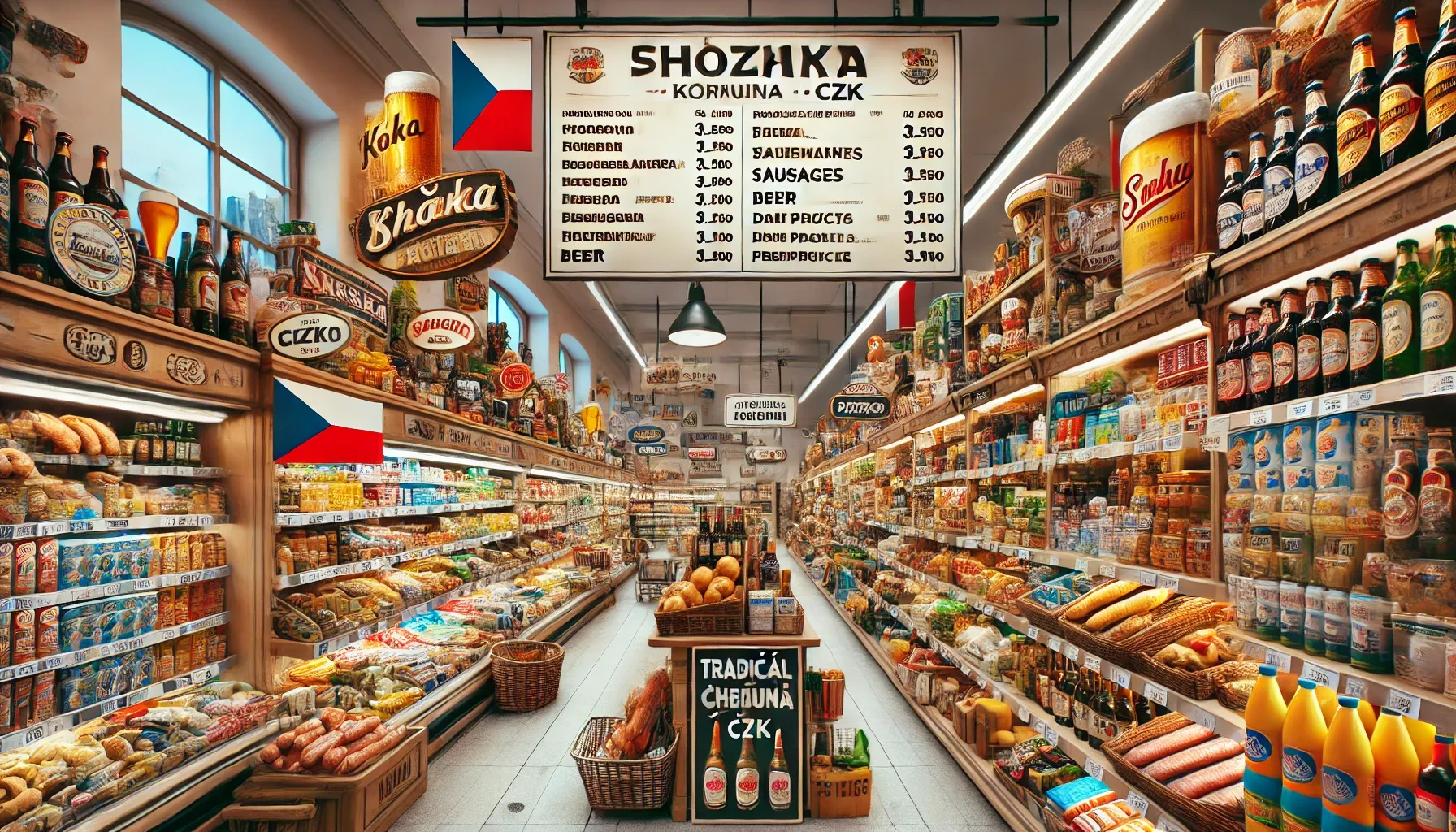Living expenses in the Czech Republic: housing, food, and transportation

- The cost of living in the Czech Republic
- Czech Republic: Cooking at home, public transportation and travel
- Travel and shopping in the Czech Republic
- Living and education expenses in Prague: what you need to know
Living expenses in the Czech Republic
The prices vary significantly depending on the region. For example, renting a home in Prague is considerably more expensive than in provincial towns. In the capital, the rent for a one-bedroom apartment on the outskirts can cost around 350-400 euros per month, while in the city center it can go up to 600 euros. These figures can change depending on the area and the conditions of the housing.
Utility payments
In addition to rent, it is important to consider utility payments. In large cities in the Czech Republic, including Prague, high demand for housing leads to high rental rates. For an accurate assessment of costs, it is essential to take into account expenses for utilities, which can vary significantly depending on various factors such as the type of heating (electric, gas, or water), availability of parking, security, green areas, and the possibility of setting up a personal garden.
Separate waste collection system
It is worth noting that Prague has a waste separation system, which helps reduce overall utility costs by decreasing the volume of waste sent to general containers. However, participation in this system remains voluntary.
Utility expenses
Families living in Prague spend on average about 150 euros per month on utilities and electricity with individual meters, including heating. electricity with individual meters, including heating. These costs can vary from 120 to 200 euros depending on the size of the apartment and its location. For example, utilities for a for a one-room apartment can be 60-70 euros per month.
Housing expenses in smaller cities
In smaller cities in the Czech Republic, housing costs are usually about 20% lower, as service companies assess their work more economically.
Food expenses
When it comes to food expenses, groceries in the Czech Republic are quite affordable. Lunches in restaurants are popular among tourists not only for their great taste but also for their generous portions. The average cost of a hearty lunch in Prague or Karlovy Vary is around 7-8 euros. However, locals can find even more budget-friendly places where a three-course meal costs about 4 euros.
Life in the Czech Republic
Thus, life in the Czech Republic offers a variety of options for different budgets. Despite the high rental rates in the capital, job opportunities and quality of life make Prague and other major cities attractive to many.
29 January 2025
29 September 2025
9 October 2024
29 January 2025
9 October 2024

Planning a trip to the Czech Republic:
If you're planning a trip to the Czech Republic and thinking about options for getting around the country, you have some great options. International bus transportation can be more economical compared to train travel. compared to traveling by train. For example, a trip from Prague to Vienna will cost you between €38 and €48 with return ticket, which is often cheaper than a similar trip by train, which ranges from €40 to €80. It is especially It is especially advantageous to take the bus for long journeys, especially if you are traveling with your family.
Traveling by car:
For those who prefer greater flexibility and comfort, renting a car or using their own vehicle may be the best solution. In the Czech Republic, gasoline costs an average of €1.03 to €1.16 per liter, while diesel fuel is around €1 per liter. The cost of renting a car starts at about €25 per day for rentals of 7-10 days, and the price may decrease with a longer rental period. It's also important to consider the cost of the vignette for using toll roads - it costs €11 for 10 days and €55.5 for a year.
Shopping and style:
As far as shopping is concerned, the Czech Republic has all the famous mass-market and luxury brands, however the latter are more common in the capital. Luxury brands are not as popular in the country as in some other European countries. European countries. Among the popular clothing stores are Marks & Spencer, Levi's, Reserved, Esprit, C&A, Adidas, Mexx, Tom Tailor, Zara, as well as local Czech brand Alpine Pro, specializing in sportswear at affordable prices, and footwear manufacturer Bata. Prices for clothing and shoes depend on the brand and type of product: for example, jeans cost from €55 to €75, T-shirts from €8 to €25, sweaters from €11 to €22, and shoes from €55 to €111.
Shopping tips:
Many locals prefer to shop during sales when prices for goods become even more affordable. On forums, it's often recommended to choose hypermarkets like Albert or Tesco for clothing purchases, especially for children.
Life and education in Prague
In the capital of the Czech Republic, there are specialized markets offering substantial discounts on goods; however, they are gradually being replaced by retail giants due to competition. This is important to consider for economical budget planning.
Education and upbringing of children
Those moving to the Czech Republic with children should know that pre-school education is available even without citizenship at a cost of about €40 per month. even without citizenship at a cost of about €40 per month. Basic education is free of charge, but requires additional costs for food (about €11) and extra classes (€4).
Choosing a private or foreign school can significantly impact expenses. For example, studying at a Russian school will cost about €100 per month, while at a Czech-Russian gymnasium, the cost is around €1500 per year.
Additional expenses
In addition to education, moving to Prague involves a number of additional expenses. Health insurance is mandatory for obtaining a visa and costs about €220 per year.
Entertainment can range from movie visits (€5.55-11) to museum visits (from €1 to €13), which should also be taken into account when planning leisure time.
Expenses for hobbies, shopping, going to pubs, and sports activities can vary significantly. For example, gym membership can cost around €90 per month.
Household expenses
The cost of the internet depends on the speed and the provider and can range from €17 to €30 per month. The monthly payment for mobile services varies from €17 to €55.
Expenses for personal care and home maintenance, including cosmetics and cleaning products, are approximately €50-75 per month for a family of two. Prices for household chemicals and hygiene products also vary and can significantly impact overall expenses.
Conclusion:
As someone with experience living in Prague, I can confirm the current situation in the real estate market and expenses in the Czech Republic. Despite the higher rental costs in major cities like Prague and Karlovy Vary, there are broader employment opportunities available here. The high demand for housing keeps rental rates elevated, including utility fees.
Understanding the details of how utility payments are formed, such as heating, green spaces, parking, and waste disposal, helps reduce expenses. The voluntary nature of waste separation in the Czech Republic also impacts homeowners' financial costs.
It's important to remember that grocery shopping in the Czech Republic is affordable, especially for those who prefer cooking at home. The country's public transportation is known for its high reliability and accessibility, making it appealing for both residents and visitors.
Thus, household expenses in the Czech Republic depend on your preferences and lifestyle, but With a variety of options and careful financial management, it is possible to successfully adapt to life in this beautiful country.
Comment
Popular Posts
29 January 2025
1530
29 September 2025
393
9 October 2024
9942
9 October 2024
1487
Popular Offers

Subscribe to the newsletter from Hatamatata.com!
Subscribe to the newsletter from Hatamatata.com!
I agree to the processing of personal data and confidentiality rules of Hatamatata






